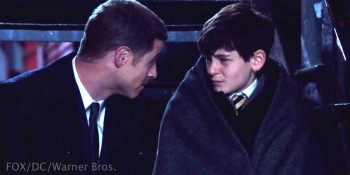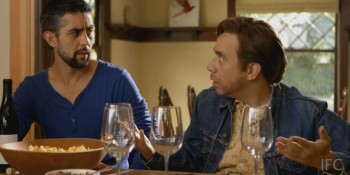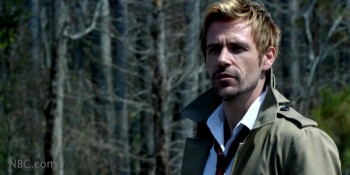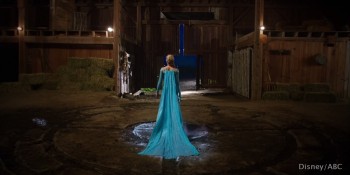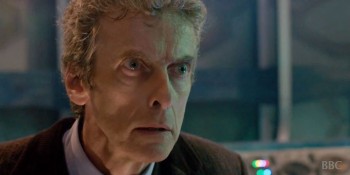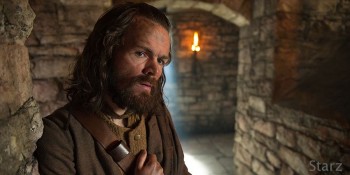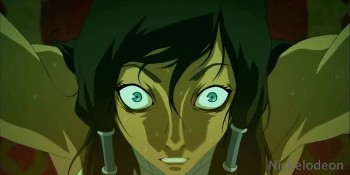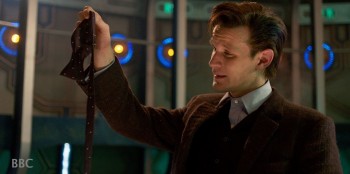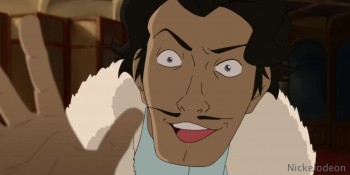The Legend of Korra’s third season has ended, and fans were treated to another incredible epic. With its latest season, The Legend of Korra proved that strong and diverse characters with powerful backstories and interesting emotional arcs can add immeasurable depth and interest to any series.
Korra’s predecessor, Avatar: The Last Airbender, saw many characters evolve across its three seasons, and Korra inherited that world with all of its implications. In Korra’s season 3, that allowed viewers to rejoin the life of Zuko, now an old man, to see how his life changed since becoming friends with Avatar Aang. But it was not the first time the series used historical continuity to build incredible characters for the world of Korra.
In Korra’s first episode, we are introduced to Tenzin, who, as the son of Avatar Aang and the water bender Katara, has the weight of the world on his shoulders. His family is the last group from the Air Nation, and we can see how Tenzin struggles with the responsibility of being the sole inheritor of a culture on the verge of extinction.
Tenzin spends the first two seasons struggling with being the son of the last Avatar. By definition, he is incapable of measuring up to the legacy of his father, whose statue stands as a beacon of hope in the waters between the Air Temple and Republic City. Tenzin literally lives in his father’s shadow and often makes decisions with his father in mind. At the same time, Tenzin is a father himself, raising four young children, fully aware that they will one day inherit his burdens.
Tenzin’s role as father is fitting, as he is the audience’s closest link to Aang and the previous generation of the show’s heroes. But for so long, Tenzin is defined and consumed only by his father’s legacy. Tenzin reaches a low point when his spiritual connections are shown to not be as strong as his own daughter’s. Tenzin beats himself up, feeling that he has let his father down, until his brother Bumi and sister Kya remind him that, while they are all Aang’s children, each one of them is also an individual. Tenzin finally realizes his value as Tenzin, the father and the mentor, and not merely the son of Aang.
Tenzin’s evolution and relationship with Korra provide some of the series’ most emotionally powerful moments. At first, Tenzin is the stuffy authority who stands in Korra’s way as she tries to live her life. But by the end of season 2, we see how much their relationship has grown into one of mutual respect and familial love. Korra makes Tenzin’s goals her own and takes it as her duty to help rebuild the Air Nation, which, after being wiped out by the Fire Nation over 100 years ago, finally has a chance to be resurrected at the beginning of season 3.
After Korra’s actions open the portals to the Spirit Dimension, the world around the Avatar begins to change drastically. Part of that change is the resurgence of air benders across the globe. Korra and Tenzin seize the moment to reestablish the Air Nation. Tenzin realizes the incredible significance as he finally has the opportunity to fulfill his father’s dreams while also creating his own legacy.
Tenzin’s strength as a leader is visible through the growth of his daughter, Jinora. Jinora started the show as a seemingly minor character, though her potential was always evident. Instead of leaving her character’s development to the imagination, the writers chose to craft an impressive story arc for her, culminating in the final scene of Korra’s third season.
Jinora shows an incredible love for history, philosophy, legends, and everything involving the Avatar and the Air Nation. It is evident from the beginning that she hopes to inherit the leadership of the Nation from her father, and with season 3, Jinora proves that she is resourceful, intelligent, and powerful. Jinora’s connection to the Spirit World gives her a power that is out of the grasp of even the Avatar, as she is able to project her consciousness across large distances. By season 3’s final scene, it is evident that Jinora has become a leader, reaching a new high, just as Korra reaches her new low.
Having two incredibly powerful woman characters would be impressive enough for any show, but The Legend of Korra goes above and beyond in showcasing powerful women. Asami, originally Korra’s rival for the affections of a boy, came into her own in the course of the show and became defined by much more than just her relationship with a boy. Asami, the head of Future Industries at a young age, stepped up in the first season as a hero, defending Team Avatar against her own father, the corrupt industrialist who was supporting the Equalists. Though she is not a bender, Asami proves herself more than capable as a fighter, utilizing her company’s technology as personal weapons and her own martial arts training to help Korra take down the leaders of the Red Lotus.
The Red Lotus, newly introduced in season 3, are four very powerful anarchist benders who seek to destroy the social order. Believing kings and presidents to be antithetical to human nature, the Red Lotus puts its philosophy into action, even succeeding in killing a world leader. Adding to the depth of these antagonists is the fact that many of the world’s leaders show themselves to be incompetent and possibly dangerous. The audience is better able to understand the characters’ motivations because there is an element of truth to what they say. Still, their actions cross a line, especially as they threaten the lives of the new members of the Air Nation.
The Red Lotus proves their might throughout the season by getting into incredible battles with characters whom the fans know are great fighters. The anarchists are able to take down all three of Aang’s children in a fair fight, establishing their credibility as a force to be reckoned with. Their dominance is then used to great effect to establish the strength of Bolin and Mako, Korra’s best friends who have to step up to the challenge of the Red Lotus warriors.
Bolin and Mako have been part of what makes Korra a great series since the beginning. The brothers of mixed nationality have a strong relationship, which we see throughout the series. Bolin, the earth bender, was always the funnier character, while Mako, the fire bender, was much more serious. The two brothers come from the streets of Republic City, where their parents were murdered, and they had to work for criminals just to survive.
Bolin and Mako are the peasants who dine with kings as they join Korra to help save the world. Mako, a detective for the police force, still mourns the death of his parents and does the best he can to be there for his brother. His growth as an independent hero continues to shine through in season 3 as his detective skills often lead the group in the right direction. But it is his emotional connection with his brother that really shines through in in the most recent season.
Bolin was always the comic relief character, and in that role has added much to the show. However, Bolin was starting to feel static by the end of Korra’s second season, which made his growth in season 3 that much more rewarding. We find out in season 3 that Bolin doesn’t have a lot of confidence in himself, which makes a lot of sense, given his brother’s abilities. Bolin tries to learn metal bending, which is a skill that very few earth benders are able to master. Bolin is shown up immediately by Korra, who masters the skill quickly. The writers play with this development throughout the season, making you believe Bolin is about to step up before ultimately failing, until the end of the season when Bolin, the perpetual comic relief character, saves everybody by proving himself in another way.
Bolin and Mako’s characters both shine incredibly when they meet their extended family for the first time. Bolin quickly learns the names of everybody and welcomes them all into his life. Mako, still reserved, finds comfort in meeting his grandmother for the first time. Their family was unaware of their parents’ passing, and when Mako has to break the news to their grandmother, he gives her his father’s scarf, which Mako has been wearing for the entirety of the show. Mako giving up the scarf to his father’s mother creates an unbelievably powerful moment shared by him, Bolin, and their family. That moment wouldn’t be possible without the long-term writing that has made the show so strong.
But whereas Bolin and Mako grow stronger for each other, we are also treated to another pair of siblings who prove that you don’t have to like each other to love each other. The Beifong sisters, Lin, and Suyin, act as parallels to many of the show’s other characters while still being compelling and powerful in their own right. The sisters are the daughters of the first metal bender, Toph Beifong, one of the protagonists in The Last Airbender, who has achieved legendary status within the Avatar World. Toph was blind and lived with an overbearing family that prevented her from living her own life until she ran away. As a parent, Toph chose to learn from her parents’ mistakes and gave her children incredible freedom, perhaps too much, with Suyin slipping into the life of a criminal and Lin going out of her way to become like her mother in an attempt to make her proud.
Lin has been around since the beginning of Korra and was originally used as another obstacle for Korra. As the chief of police, Lin was unwilling to let Korra run free in her city, finding the Avatar’s attitude and behavior to be frustrating and, at times, illegal. In time, however, Lin and Korra’s relationship grew into one of respect, and the two powerful women have been saving each other’s lives frequently ever since.
In season 3, we learn that, like Tenzin, Lin has never been able to get out of the shadow of her more famous parent. Suyin, who has since reformed and become a great leader of the Metal Clan, reveres her mother, continuing to build on her legacy since Toph has disappeared. Suyin does her best to convince Lin of her changed attitudes, but it takes much persuasion and an epic metal-bending fight to finally put the past in the past.
Lin and Suyin are able to move past their differences without ever acting as though their problems don’t exist. Like Bolin and Mako as they take on two of the Red Lotus members, Lin and Suyin work together, saving each other’s lives, to fight the incredibly powerful combustion bender of the Lotus.
Adding to all of these incredible characters is the series’ title star, Korra. Korra was always powerful, always skilled, and always sure of herself. Revered as a demigod since birth, Korra became abrasive, expecting everyone to listen to her and allow her to do as she pleased, leading to early season head-bumping with Tenzin and Lin. In season 2, her attitude almost sparked a civil war, but she came into her own as a leader by connecting to the Spirit World and gaining a greater understanding of the world in which she lives.
In season 3, however, Korra is pushed to the brink. Her decision to leave open the Spirit portals has proven very unpopular, and the people of the world don’t like how their world has been forever changed. Korra faces constant public scrutiny for her decisions, even leading to her banishment from Republic City.
Korra has also become the first Avatar since the original to be unable to speak with her past lives. For much of the show, when the Avatar reached rock bottom, Aang or Korra could call upon the spirits of their predecessors to offer guidance. With the opening of the Spirit portal, however, Korra’s connection has been severed. With the Avatar no longer acting as a bridge to the Spirit World, and without her connection to her past lives, in addition to the Equalists and the Red Lotus calling the Avatar a relic of a bygone era, Korra’s confidence in her ability and her importance to the world are thoroughly shaken. In overcoming the challenge of the Red Lotus, Korra was left broken, in a wheelchair, questioning if she is even needed anymore.
With Korra’s growth as a character, the stakes of the show have been raised. We are left with the idea that the world could really lose its Avatar as it modernizes into a society more familiar to us. The changing times may prove that the Avatar is no longer needed, and Korra could truly be the last. With that idea comes the possibility that The Legend of Korra’s title character will actually die, adding a new layer of interest to the show’s fourth and final season.
By the third season finale of The Legend of Korra, the audience is able to see the incredible depth of characters — and depth of character — that makes Korra so compelling. No fewer than nine heroes get to shine in the final battle, as four distinct and established villains fight them to the bitter end. Each fight carries with it greater emotional weight: we see the relationships between brothers, sisters, and fathers and their daughters. Even subtle moments carry the weight of history in them, such as the moment when Lord Zuko learns that Korra spoke with his uncle, which fans of The Last Airbender will remember was the most compelling relationship of that show.
The end of the season again establishes a new status quo as a Nation slowly rebuilds, a leader steps up, and another hits rock bottom. In an incredible move, the creators of The Legend of Korra have given us three straight epic seasons, full of action, adventure, drama, comedy, politics, philosophy, history, and rich characters. Without a doubt, The Legend of Korra will go down in history as one of the most unexpectedly great shows.
